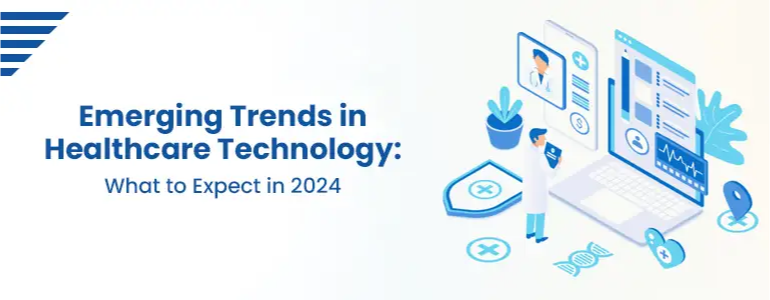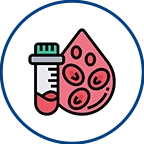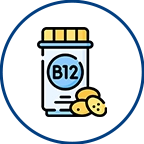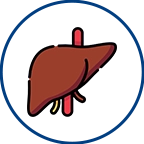Emerging Trends in Healthcare Technology: What to Expect in 2023

In recent years, the healthcare industry has witnessed an unprecedented wave of technological advancements. From artificial intelligence to telemedicine, these innovations have transformed the way healthcare is delivered and managed. As we step into 2023, it's clear that this momentum is not slowing down. Here are the key emerging trends in healthcare technology that we can expect to see in the coming year.
AI-powered Clinical Decision Support Systems
Artificial Intelligence (AI) is poised to play an even more significant role in clinical settings. Huge volumes of patient data can be analyzed by AI algorithms to help medical personnel develop diagnosis and treatment plans that are more precise. This may result in better patient outcomes and more effective resource management.
Home Sample Collection
Expansion of Telemedicine and Remote Monitoring
The pandemic catapulted telemedicine into the mainstream, and this trend is here to stay. In 2023, we can expect to see further advancements in telehealth platforms, including enhanced features for virtual consultations, integrated wearable devices for remote patient monitoring, and secure messaging systems for seamless communication between patients and providers.
Blockchain for Health Data Security
Blockchain technology is gaining traction in healthcare for its potential to enhance data security and interoperability. By creating a decentralized and tamper-proof ledger, patient records can be securely stored and shared across different healthcare providers. This ensures that sensitive information remains confidential and accurate.
Personalized Medicine and Genomics
Advancements in genomics and genetic testing are enabling a shift towards personalized medicine. By analyzing an individual's genetic makeup, healthcare providers can tailor treatment plans to match specific genetic markers. This strategy has the potential to greatly increase therapeutic efficacy while reducing adverse effects.
Augmented and Virtual Reality in Healthcare
Augmented Reality (AR) and Virtual Reality (VR) are making their mark in healthcare, offering innovative solutions for training, surgical planning, and patient education. In 2023, we can anticipate more sophisticated applications of AR and VR in medical education, surgical simulations, and therapeutic interventions.
5G and IoT for Healthcare Connectivity
The rollout of 5G technology will pave the way for faster and more reliable connectivity. This is particularly crucial for the Internet of Things (IoT) in healthcare, where devices such as wearable monitors and smart implants communicate in real-time. Remote patient monitoring and telemedicine will become more feasible thanks to 5G's higher bandwidth and low latency.
Voice Technology and Natural Language Processing
Voice-assisted technology and Natural Language Processing (NLP) are becoming integral parts of healthcare interactions. From transcribing patient notes to providing voice-activated medical guidance, these technologies are streamlining administrative tasks and improving patient-provider communication.
Robotics and Automation in Healthcare Delivery
Robotic technology is evolving to assist in a wide range of healthcare tasks. This includes everything from robotic surgery systems to automated medication dispensing. In 2023, we can expect to see further integration of robotics in healthcare to enhance precision, reduce human error, and increase efficiency.
Conclusion
As we look ahead to 2023, it's evident that technology will continue to be a driving force in shaping the future of healthcare. These emerging trends hold the promise of more accessible, efficient, and personalized healthcare experiences for patients and providers alike. Embracing and adapting to these innovations will be essential for healthcare organizations to stay at the forefront of this rapidly evolving industry. Stay tuned for an exciting year of breakthroughs and advancements in healthcare technology!
Frequently Asked Questions
What is the significance of AI-powered Clinical Decision Support Systems in healthcare?
AI-powered Clinical Decision Support Systems utilize artificial intelligence to analyze patient data, aiding healthcare professionals in making accurate diagnoses and treatment decisions. This technology is poised to enhance patient outcomes and streamline healthcare delivery.
How will telemedicine and remote monitoring evolve in 2023?
In 2023, we can expect further enhancements in telehealth platforms, offering improved virtual consultation experiences. Additionally, there will be greater integration of wearable devices for remote patient monitoring, enabling healthcare providers to keep a closer eye on patients' health outside of clinical settings.
What role does blockchain play in securing health data?
Blockchain technology provides a decentralized, tamper-proof ledger for storing and sharing patient records. This ensures the security and integrity of sensitive health information, making it an invaluable tool for safeguarding patient data in healthcare systems.
How does personalized medicine based on genomics benefit patients?
Personalized medicine leverages genomic information to tailor treatment plans to an individual's specific genetic makeup. This approach enhances treatment efficacy, potentially reducing side effects and improving overall patient outcomes.
What are the applications of Augmented and Virtual Reality in healthcare?
Augmented and Virtual Reality have diverse applications in healthcare. They are used for medical education, surgical simulations, and even therapeutic interventions. These technologies offer immersive experiences that can significantly enhance training and patient care.
How will 5G and IoT impact healthcare connectivity in 2023?
The rollout of 5G technology will provide faster and more reliable connectivity, which is crucial for the Internet of Things (IoT) in healthcare. This will enable real-time communication between various healthcare devices, enhancing remote patient monitoring and telemedicine capabilities.
What are the benefits of incorporating voice technology and NLP in healthcare interactions?
Voice technology and Natural Language Processing (NLP) streamline administrative tasks in healthcare by automating tasks like transcribing patient notes. Additionally, they facilitate more natural and efficient communication between patients and healthcare providers, ultimately enhancing the overall healthcare experience.
Book Your Slot
Our Locations Near You in Hyderabad
3KM from Banjara Hills
1.9KM from Yusufguda
3KM from Madhura Nagar
5KM from Shaikpet
Profiles
- Cardiac Risk Profile
- Pituitary marker Profile
- Rheumatoid Arthritis Profile
- Dengue Fever Panel
- Lung Cancer Panel 1 Complete Molecular
- Gastroenteritis Screening Panel
- Thyroid Profile (T3,T4,TSH), Serum
- Pancreatic Marker Profile
- STD profile
- Androgen Profile
- Lipid Profile, Serum
- Pancreatic(acute)Profile
- PCOD Profile
Radiology
Pathology Tests
- Glucose Fasting (FBS),Sodium Fluoride Plasma
- Creatinine, Serum
- Glycosylated Hemoglobin (HbA1C)
- Vitamin B12 (Cyanocobalamin), Serum
- Thyroid Stimulating Hormone (TSH) Ultrasensitive, Serum
- Complete Urine Examination (CUE), Urine
- Liver Function Test (LFT),Serum
- Dengue (IgG & IgM), Serum
- Dengue Antigen (Ns1) Rapid, Serum
- C-Reactive Protein (CRP), Serum
- Widal (Slide Method), Serum
- Total IgE, Serum




